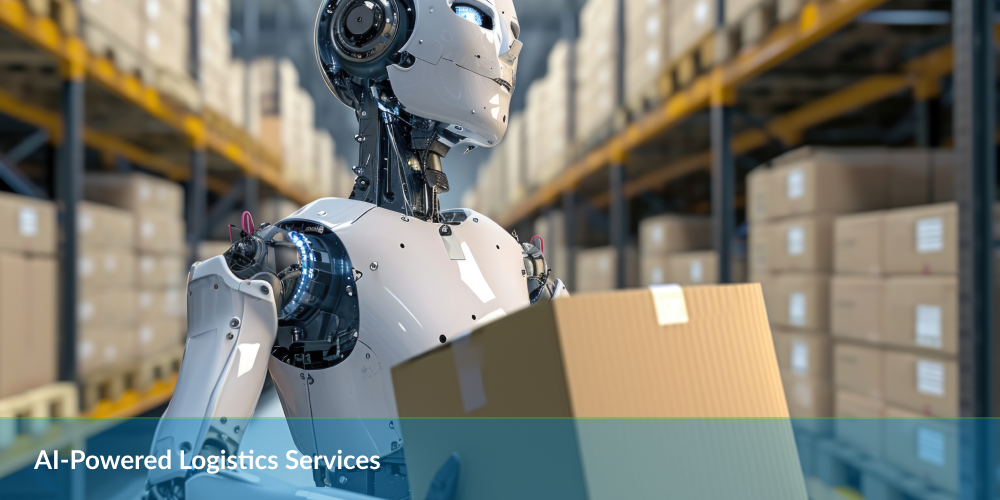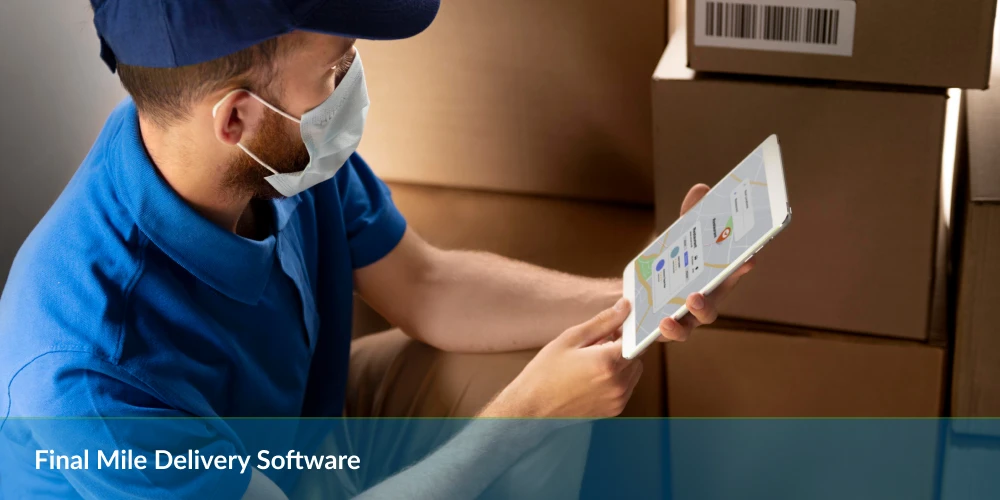Table of Contents
What if you could predict logistics disruptions before they happen and optimize every aspect of your supply chain? In today’s logistics sector, data is the key to making smarter, more strategic decisions. AI-powered logistics services leverage the vast potential of big data to transform traditional operations, offering valuable insights that improve efficiency across the board. By analyzing transportation patterns, inventory levels, and potential disruptions, these services enable businesses to adjust their strategies proactively.
Freight companies using AI-powered logistics services tools see a tangible benefit, such as reduced shipping delays and better inventory control. With the ability to analyze data in real time, AI helps businesses identify trends and make data-backed decisions on everything from route planning to warehouse management. This ability to act on insights quickly can lead to smoother operations and a more responsive supply chain.
Beyond day-to-day operations, AI in logistics also plays a crucial role in enhancing customer satisfaction. By reducing delays and optimizing processes, companies can offer faster and more reliable services, directly contributing to improved customer experiences. With predictive analytics and machine learning, logistics firms are not only reacting to changes in their environment but are actively shaping their strategies to stay ahead of the competition. This data-driven approach provides a significant competitive edge and drives better financial outcomes.
Transforming Logistics: The AI Revolution
Logistics operations are often plagued by inefficiencies, but AI-powered logistics services are here to change that. By leveraging machine learning, predictive analytics, and intelligent algorithms, AI is reshaping how warehouse operations, inventory management, and transportation are handled. These technologies are unlocking new levels of efficiency, enabling businesses to streamline complex logistics tasks and stay competitive in an ever-evolving market.
AI is playing a pivotal role in optimizing logistics performance. Machine learning algorithms analyze historical data to forecast demand, helping companies maintain optimal inventory levels and avoid overstocking accurately. On the other hand, in warehouses, AI-powered robotics transform package handling and sorting processes, boosting speed and precision. Autonomous vehicles are also revolutionizing transportation by utilizing real-time data to select the fastest and safest delivery routes, further enhancing operational efficiency.
Additionally, AI-powered logistics services are improving the reliability of logistics operations through predictive maintenance. By analyzing performance data, AI can predict equipment failures before they happen, allowing for timely repairs and reducing costly downtime. This proactive approach ensures smoother, more reliable logistics systems, keeping operations on track and minimizing disruptions to service.
Optimizing Supply Chain with Predictive Analytics
Predictive analytics transforms supply chain management, using historical data to forecast future events. This analytical tool employs a mix of data, machine learning, and algorithms to predict potential outcomes. This foresight allows companies to plan with precision, ensuring they are better equipped to meet consumer demand and manage inventory efficiently.
Defining Predictive Analytics in Supply Chain Management
In supply chain contexts, predictive analytics processes past and present data to foresee future supply and demand trends. It creates actionable insights, enabling managers to preempt issues before they escalate into larger problems that could disrupt the supply chain.
How Predictive Analytics Manages Supplier Relationships & Reduces Costs
Predictive analytics helps identify reliable suppliers by evaluating past performance data fostering stronger partnerships. It also pinpoints areas where costs can be curtailed, from procurement to distribution, by predicting potential bottlenecks and price fluctuations.
Companies that integrate predictive analytics into their operations can anticipate market changes, adjust supply chain activities accordingly, and maintain a competitive edge. This foresight streamlines processes and contributes to substantial cost reductions and efficiency improvements.
Route Optimization for Time and Cost Savings
Route optimization redefines the process of selecting the most efficient paths for transportation. This system integrates complex algorithms, historical data, and real-time traffic conditions to determine the quickest or cheapest travel routes for cargo deliveries.
Exploring AI solutions that optimize delivery routes
AI plays a pivotal role in interpreting vast datasets and simulating numerous route scenarios in a fraction of the time humans require. AI-powered tools study traffic patterns, weather reports, vehicle capacity, and road conditions to stipulate optimal delivery schedules and sequences.
The direct impact of optimized routes on delivery times and fuel costs
Streamlined routes significantly reduce delivery times by avoiding congestion and various delays. This efficiency accelerates the supply chain and translates into marked fuel savings. Lower fuel consumption is a by-product of less time spent on the road, and fewer miles traveled, which also diminishes the environmental footprint of transport activities.
- An AI-driven route optimization leads to reduced operational costs as vehicles cover shorter distances at less congested times.
- A decrease in delivery times enhances customer satisfaction and improves the reliability of the service offered.
- Conserving fuel contributes to lowering overall transportation expenses.
Pro Tip: Leverage AI-driven route optimization to cut delivery times, reduce fuel costs, and enhance customer satisfaction.
The Power of Real-time Tracking in Logistics
Visibility remains a cornerstone in logistics operations, offering a panoramic view of where assets are at any given moment. The convergence of AI and IoT technologies has catalyzed the evolution of real-time tracking systems. By harnessing these technologies, logistics services deliver unprecedented transparency and control.
Real-Time Tracking through AI and IoT Technologies
Through the incorporation of AI-powered tools and IoT devices, logistics providers can monitor cargo across vast distances with granular precision. Sensors affixed to shipments feed data back to AI systems. This data, often highly detailed, reflects location, condition, and estimated arrival time. These robust systems process the incoming information, allowing decision-makers to act confidently when faced with dynamic logistics landscapes.
Embedded in these technologies, machine learning algorithms predict potential delays by analyzing historical traffic patterns, weather data, and other variables affecting transit. AI-powered logistics services deploy this data strategically, ensuring stakeholders can adapt their strategies at a moment’s notice, navigating unforeseen disruptions with ease and maintaining the flow of goods.
- Real-time tracking technologies detect anomalous conditions that may signify theft, damage, or system failures, prompting immediate responses.
- Continuous monitoring enables swift reactions to in-transit issues, mitigating risks and reducing downtime.
- The integration of IoT devices in logistics systems provides a continuous stream of data used to optimize future operations.
Real-Time Data: Crisis and Issue Management
During crises or issue escalation, real-time tracking proves indispensable. The availability of up-to-the-second data facilitates immediate response to any discrepancies or emergencies that may arise. GPS tracking, environmental monitoring, and real-time notifications allow for the rerouting of vehicles or the reassignment of resources at the push of a button. Consequently, warehouses can prepare for early or delayed arrivals, adapting labor and resources accordingly. The result is a more resilient supply chain equipped to handle the unpredictable nature of global logistics.
Enterprises leveraging AI in their tracking systems ensure timely delivery and high service levels. This technological sophistication positions them to address issues, often before clients are even aware proactively. For example, if a container’s temperature deviates beyond safe thresholds, the system alerts operators instantly, allowing for corrective measures that safeguard product integrity.
Forecasting Demand with Machine Learning
Machine learning algorithms analyze historical data and identify patterns to predict future demand in the logistics industry. By processing vast datasets from past transactions, machine learning equips businesses with the foresight to make informed decisions regarding inventory levels, workforce management, and delivery schedules.
Precise demand forecasting leads to optimal inventory management. Businesses can maintain lean inventory, mitigating the risk of overstocking or stockouts. This precision results in cost savings by ensuring the right products are available at the right time, thus minimizing capital tied up in unsold stock and reducing storage costs.
Logistics operations harness anticipated demand to fine-tune their strategies. By predicting peak periods, businesses can adjust their shipping schedules, allocate resources more efficiently, and optimize their supply chain. Furthermore, machine learning facilitates dynamic pricing models that respond in real-time to changes in demand, maximizing profitability.
With machine learning, companies can predict what and when the customers will buy and the most efficient ways to dispatch and deliver products. The integration of this technology becomes imperative for businesses seeking to excel in customer satisfaction and operational efficiency.
Intelligent Transportation Systems (ITS) for Dynamic Logistics
Intelligent Transportation Systems leverage advanced applications to provide innovative services related to different modes of transport and traffic management. By integrating telecommunications, electronics, and information technologies with transport engineering, ITS enhances the efficiency, safety, and sustainability of the transportation network. These systems have become indispensable in the logistics sector for optimizing the movement of goods.
Integration of AI in ITS
Deploying artificial intelligence within ITS transforms transportation processes by enabling adaptive algorithms that respond to real-time traffic data. ITS uses AI to analyze patterns, predict traffic congestion, and suggest optimal routes. As a result, logistic companies experience a reduction in delivery times and fuel consumption through dynamic route optimization, minimizing the environmental footprint while maximizing delivery efficiency.
The Human Element in an AI-Driven Environment
While artificial intelligence significantly automates operations, the human workforce still plays a critical role. Workers must adapt to AI tools, learning to interpret insights and make strategic decisions based on AI-generated recommendations. Training programs and continuous education ensure that employees remain proficient in these evolving technologies, aligning their skills with the needs of an AI-enhanced logistics industry.
Rethinking Inventory Management with AI
Traditional inventory management often grapples with forecasting errors, overstocking, and lost sales due to out-of-stock scenarios. AI-powered logistics services overhaul these archaic systems by harnessing advanced algorithms that delve into vast datasets to inform decisions and refine inventory levels. For companies, this means a transition from guesswork to precision.
How AI Transforms Inventory Optimization and Cost Management
AI-based systems analyze historical sales data, market trends, and other influential factors to predict demand with a high degree of accuracy. These predictive insights enable businesses to hold the optimal amount of stock, trimming storage costs and minimizing waste. Furthermore, dynamic pricing strategies derived from AI analysis help liquidate excess stock without substantial profit loss.
Inventory replenishment cycles benefit from automation, as AI determines the best times to reorder based on lead times and the probability of stockouts. This comprehensive approach to inventory management extends to the return management process, where AI can predict returns and adjust inventory accounting accordingly.
Balancing AI Operations with Human Oversight
Successful integration of AI into inventory management requires a synergy between technology and human expertise. Warehouse managers supervise AI recommendations to apply contextual and experiential knowledge that AI may not fully grasp. Moreover, employees focus on strategic roles and customer service while AI automates routine, data-heavy tasks.
Human oversight also ensures flexibility, allowing for adjustments when AI predictions do not align with real-world occurrences. This collaboration paves the way for continuous learning systems where AI can incorporate feedback and improve over time, continually enhancing inventory management practices.
Embracing the Future with Autonomous Vehicles
Autonomous vehicles actively reshape freight transportation. Current advancements demonstrate that, within certain controlled environments, these vehicles perform tasks traditionally requiring human oversight. After years of research and development, select logistics operations incorporate autonomous trucks for regular yet simple duties, such as highway transportation or traversal within defined industrial areas.
Analysts forecast significant efficiencies and cost reductions once autonomous vehicles are fully integrated into logistics. Substantial savings materialize through reduced labor costs, increased fuel efficiency, less equipment wear due to more consistent driving habits, and diminished accident-related expenditures. Furthermore, autonomous vehicle fleets enable a nearly continuous operation unbounded by human drivers’ need for rest, promising marked improvements in operational throughput.
Nevertheless, the proliferation of autonomous freight vehicles brings concerns regarding safety and regulatory compliance to the forefront. Regulatory frameworks adapt, and any international or local clearance for autonomous freight operations mandates comprehensive safety assurances. Thus, companies adopting this technology invest heavily in sophisticated sensing and decision-making capabilities to ensure autonomous vehicles can navigate safely, alongside stringent provisions for fail-safe measures in the event of system malfunctions.
Fleet operators may begin transitioning to autonomous vehicles by incorporating partial automation features, acclimatizing their infrastructure and workforce to the progressive shift. Leveraging the increasing reliability and capability of these systems, businesses prepare for a future where autonomous vehicles are ubiquitous and logistics operations are profoundly more efficient and safer as a result.
Leveraging Chatbots for Enhanced Customer Service
AI-powered chatbots have transformed customer service within the logistics sector. Clients now experience unparalleled service availability due to the implementation of chatbots that offer round-the-clock support. Immediate response times are a hallmark of these intelligent systems, providing answers to queries faster than ever. Moreover, personalized service has become a reality, as chatbots analyze customer data to tailor conversations and solutions specific to individual needs.
Combining human intelligence with chatbot efficiency represents a significant advancement in customer service. Chatbots handle routine inquiries, freeing human agents to address complex issues that require empathy and nuanced understanding. This hybrid model ensures that customer service is efficient and capable of handling intricate customer needs effectively.
- AI chatbots deliver continuous support without the constraints of business hours.
- Customers receive instant responses, reducing wait times and increasing satisfaction.
- Personalization is achieved by leveraging customer data to provide relevant information and solutions.
The utilization of chatbots is a strategic move that enhances overall customer service quality while optimizing operational costs. This technology does not replace the need for human touch in customer service but rather augments it, ensuring all customer interactions are handled with the utmost efficiency and care.
Smart Logistics with IoT-Enabled Technology
At the intersection of logistics and technological innovation lies the transformative potential of IoT-enabled technology. By integrating the Internet of Things (IoT) into logistics operations, businesses gain unprecedented visibility and control over their supply chains. These systems empower decision-makers with real-time data on asset location, condition, and environmental factors, bridging the information gap in complex logistical ecosystems.
Defining the Internet of Things (IoT) and its logistics applications
The Internet of Things refers to a network of physical objects embedded with sensors, software, and other technologies purposed for connecting and exchanging data with other devices over the Internet. In logistics, IoT devices track shipments, monitor storage conditions, and automate inventory with impressive precision. Integration of such devices promotes an efficient, responsive, and adaptable logistical infrastructure.
The synergy of IoT and human decision-making for problem-solving
While data is an invaluable byproduct of the IoT, its true value is unlocked when combined with human insights for strategic problem-solving. Operators equipped with IoT data can identify patterns, anticipate disruptions, and devise interventions that preemptively address potential issues in the supply chain. As this technology advances, the partnership between IoT and skilled logistics professionals is set to reshape how the industry tackles its most challenging problems.
With IoT, businesses transcend traditional boundaries in logistics, crafting a smarter, more responsive, and agile operational model. As this technology evolves, the seamless fusion of digital and physical components within logistics networks will become an industry standard rather than an exception.
Sustainable Logistics via AI
AI-powered logistics services carry the potential for marked enhancements in environmental sustainability. By drawing on vast data sets and predictive analytics, these technologies can streamline operations to minimize waste, reduce energy consumption, and cut emissions.
Addressing Sustainability Issues in Logistics Through AI Optimization
Efficient route planning generated through AI reduces fuel consumption and, in turn, carbon footprints. Smart algorithms account for traffic, weather, and delivery urgencies, creating optimal routes that save time and resources. Warehouses equipped with AI systems can monitor energy usage and automate lighting, heating, and cooling control for peak times, contributing to substantial energy savings.
Examples of Eco-Friendly Practices Enabled by AI
- Autonomous electric vehicles, orchestrated by AI, bolster fleets that generate zero emissions.
- Machine learning algorithms improve packing algorithms, leading to a decrease in packaging material waste and an uptick in the number of items shipped per load.
- Dynamic pricing models for freight transport can incentivize off-peak operation, thereby balancing the load on infrastructure and reducing congestion-related emissions.
These practices not only carve the way for a more sustainable future but, when communicated effectively, enhance brand image and consumer trust in companies that prioritize environmental stewardship.
AI-driven logistics services break old paradigms, setting in motion a cascade of environmentally conscious operations that benefit the planet while keeping efficiency at the forefront.
Enhancing Data Security and Privacy in AI-Powered Logistics
In the arena of AI-powered logistics services, safeguarding data is paramount. With an abundance of sensitive information circulating within logistics networks, protecting this data from unauthorized access and breaches maintains trust and complies with regulatory standards. Advanced technologies, including encryption and blockchain, have become instrumental in creating robust defenses against cyber threats.
Deploying Encryption Techniques
Encryption transforms sensitive logistics data into a format unreadable to anyone without authorized access. This cryptographic method ensures that the information remains secure and unintelligible even if data interception occurs.
Human Oversight in Technological Landscapes
While sophisticated technologies play a critical role in data security, human expertise remains indispensable. Professionals trained in cybersecurity measures oversee systems and processes, responding to threats and maintaining the secure use of AI-powered logistical tools. Data security is a shared responsibility, where technology and human vigilance work in unison to protect sensitive information.
Key Takeaways
AI Optimizes Supply Chain Efficiency: AI-powered logistics services help improve operational efficiency through predictive analytics, route optimization, and real-time tracking, reducing delays and cutting costs.
Enhanced Customer Satisfaction: By leveraging AI and machine learning, logistics companies can offer faster, more reliable services, directly contributing to a better customer experience.
Predictive Analytics for Smarter Decisions: Predictive analytics enables businesses to forecast demand, optimize inventory levels, and manage supplier relationships, minimizing risks and reducing operational costs.
AI-Driven Sustainability: AI technologies in logistics enhance environmental sustainability through optimized routing, energy-efficient warehouses, and eco-friendly autonomous vehicles, reducing emissions and waste.
Data Security and Privacy: Advanced encryption, blockchain, and human oversight ensure the protection of sensitive logistics data, maintaining trust and complying with regulatory standards.
Wrapping It Up!
Freight forwarders and third-party logistics providers gain substantial advantages by integrating AI technologies. These benefits span from deepened insights drawn from data analytics to enhancements in supply chain efficiency. Predictive analytics shape demand forecasting accuracy, while automated warehouses elevate operational throughput. AI contributes to significant time and cost savings through route optimization and transforms customer services by deploying responsive chatbots.
Adapting to AI technologies no longer remains an option for logistics providers aiming to thrive in a competitive market. The adoption of these powerful tools is synonymous with leveraging intelligent transportation systems for dynamic logistics operations, unlocking the potential for increased transparency with blockchain, and enhancing inventory management.
While redefining quality control with machine vision and fostering robust data security measures, the logistics sector must maintain an equilibrium between technology and the invaluable human element. Collaboration between robotic efficiency and human ingenuity is the key to a truly progressive logistics framework.
Transform your logistics with AI-powered logistics services from NetworkON and enhance supply chain efficiency, optimize routes, and boost customer satisfaction.
Partner with us today for smarter, faster, and cost-effective logistics operations.
Frequently Asked Questions
How can AI-powered logistics services improve my supply chain?
AI-powered logistics services enhance supply chain efficiency by using predictive analytics to forecast demand, optimize routes, and manage inventory in real-time, resulting in cost savings, reduced delays, and improved operational flow.
What are the benefits of route optimization using AI in logistics?
AI-based route optimization helps reduce delivery times and fuel costs by analyzing traffic patterns, weather conditions, and vehicle capacities to select the most efficient routes, ultimately improving customer satisfaction and minimizing environmental impact.
How does AI contribute to sustainability in logistics?
AI helps drive sustainability by reducing fuel consumption through efficient routing, automating energy management in warehouses, and enabling eco-friendly technologies like autonomous electric vehicles, which lower emissions and operational waste.
Is the data in AI-powered logistics services secure?
Yes, data security is a top priority in AI-powered logistics. Advanced encryption, blockchain, and human oversight protect sensitive data from unauthorized access, maintaining trust and compliance with regulatory standards.





0 Conversations